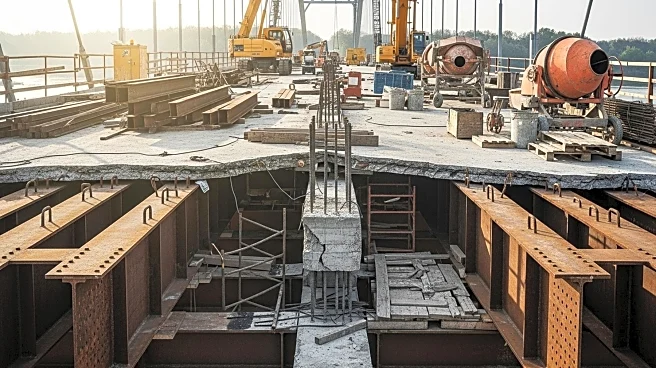What's Happening?
The CEO of American Infrastructure Partners, Bob Hellman, has emphasized the critical funding challenges facing U.S. infrastructure, particularly in bridge and road repairs. According to the American Road & Transportation Builders Association, 220,295 U.S. bridges require repair, with 74,472 needing replacement. The estimated cost for these repairs is approximately $400 billion. Despite the 2021 infrastructure law allocating $40 billion for bridge repairs, the funds fall short of the actual needs. Hellman advocates for private infrastructure investment as a complementary solution to public funding, citing successful public-private partnerships like Pennsylvania's Rapid Bridge Replacement program. This approach aims to expedite project delivery and improve lifecycle efficiencies.
Why It's Important?
The state of U.S. infrastructure is a pressing concern, with significant implications for public safety and economic efficiency. The deteriorating condition of bridges and roads can lead to catastrophic failures, as highlighted by the Baltimore Key Bridge disaster. The funding gap, exacerbated by inflation, limits the ability to address these issues solely through public funding. Private investment offers a potential solution by providing additional capital and accelerating project timelines. This approach could alleviate the backlog of infrastructure projects, ensuring safer and more reliable transportation networks, which are vital for economic growth and public welfare.
What's Next?
The ongoing debate over infrastructure funding is likely to continue, with stakeholders considering the balance between public and private investment. As states utilize the allocated federal funds, the role of private capital may become increasingly significant in bridging the funding gap. Future infrastructure projects may see more public-private partnerships, with a focus on transparent procurement and long-term maintenance commitments. The challenge will be to set terms that protect public interests while leveraging private investment to deliver essential infrastructure improvements.
Beyond the Headlines
The reliance on private capital for infrastructure projects raises ethical and legal considerations, particularly regarding accountability and public interest protection. Ensuring that private investments do not compromise public safety or lead to increased costs for taxpayers is crucial. Additionally, the integration of private funding must be managed to prevent potential conflicts of interest and ensure equitable access to infrastructure improvements across different regions.









